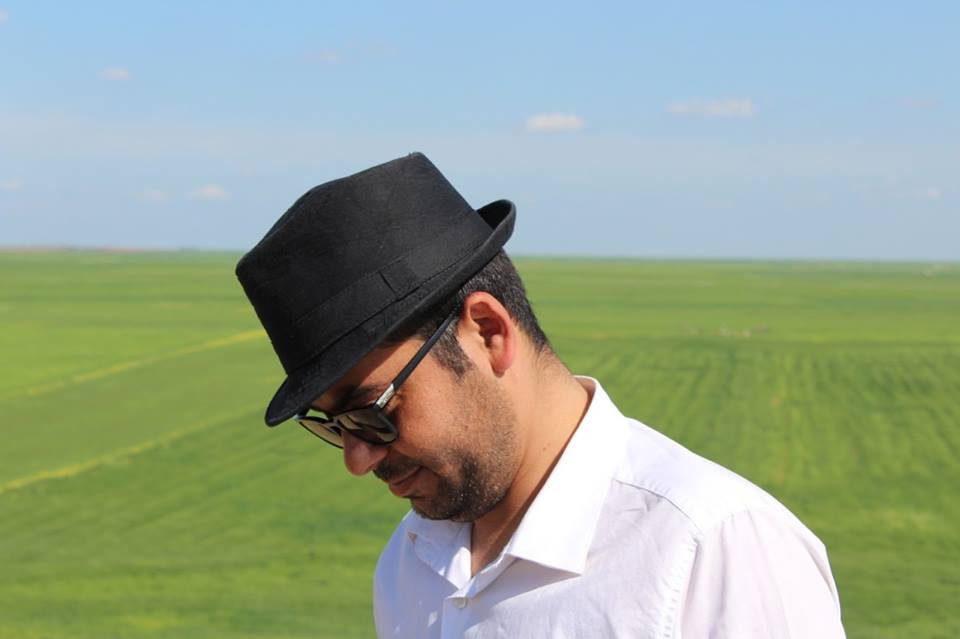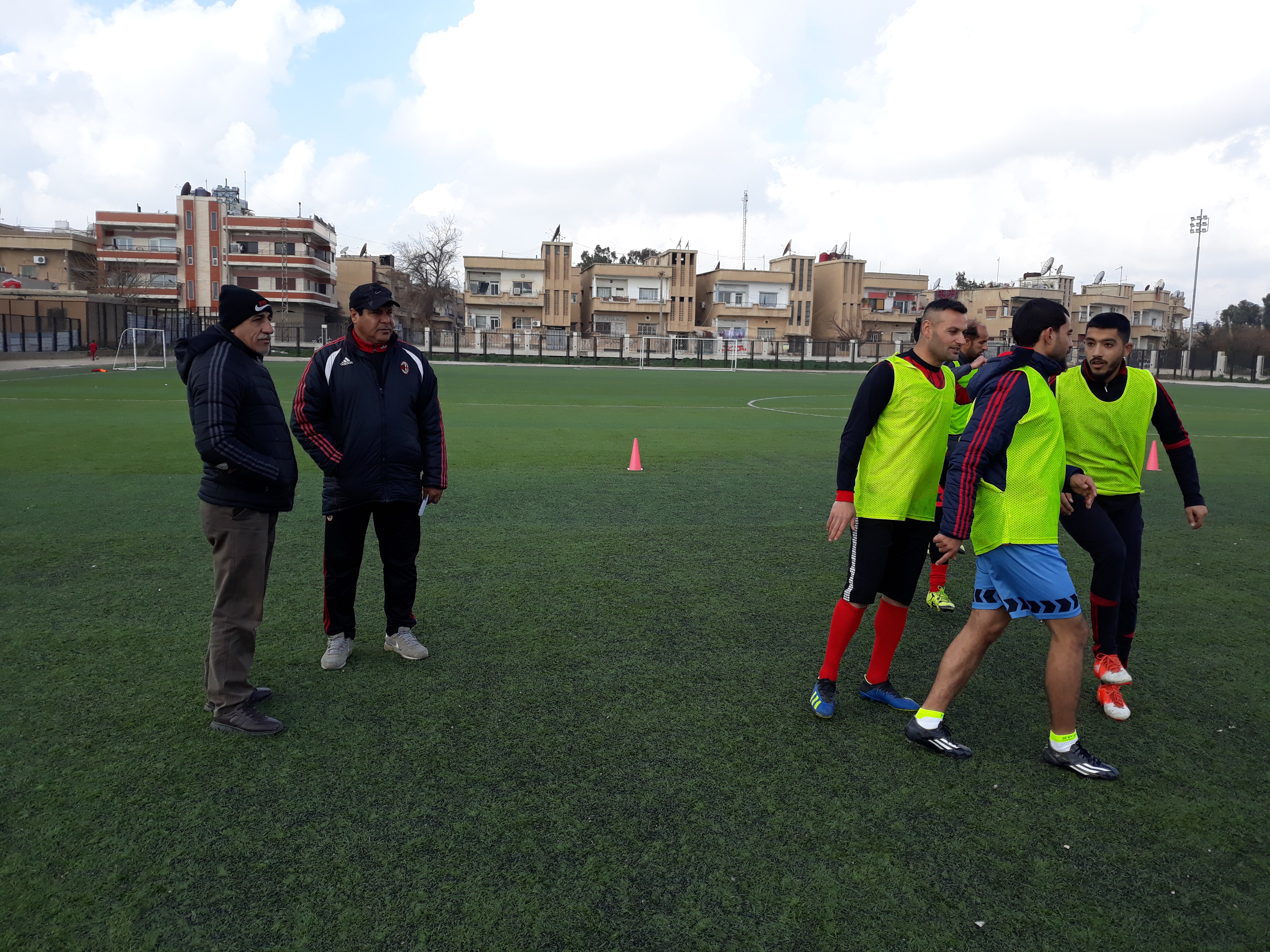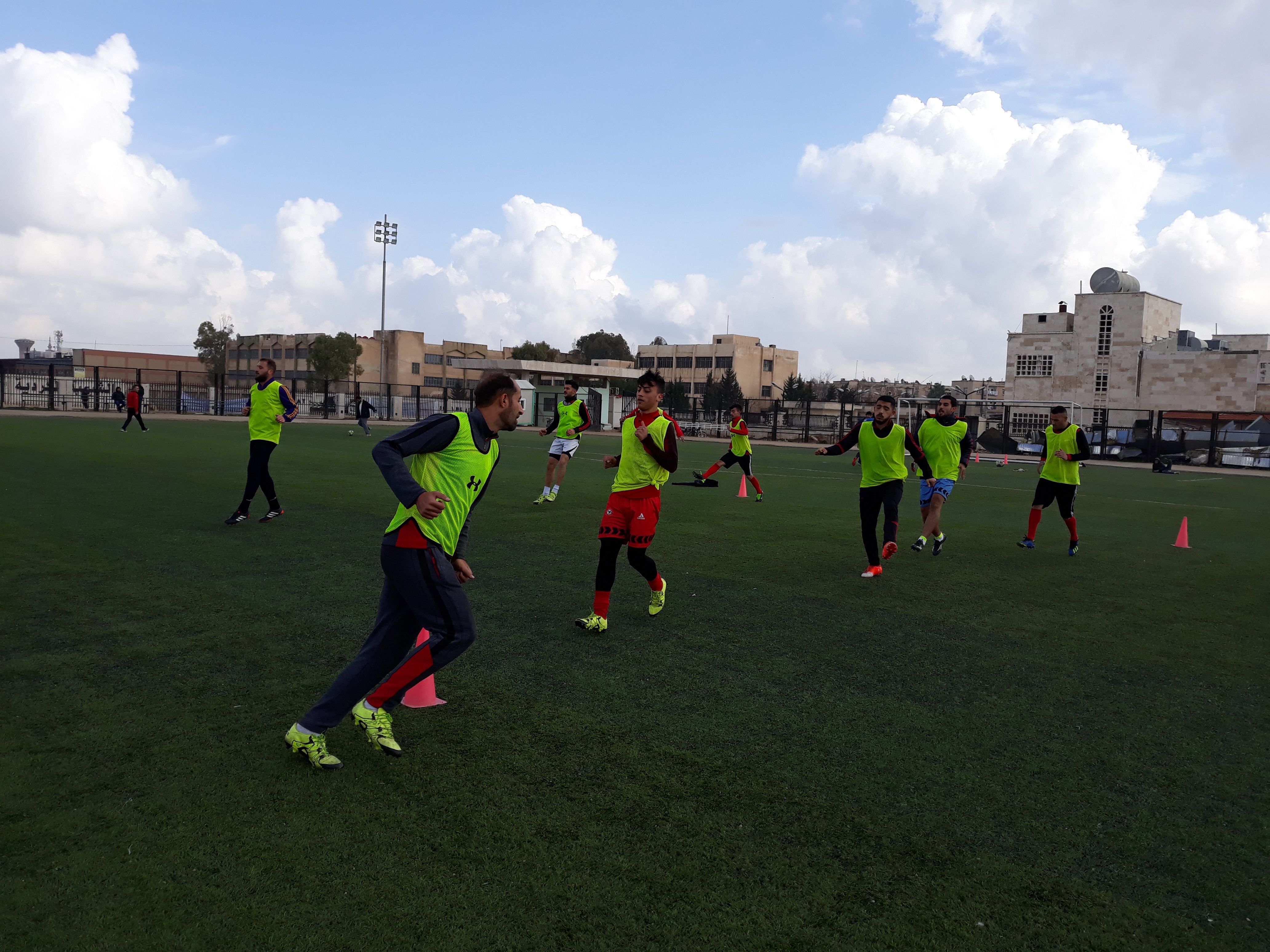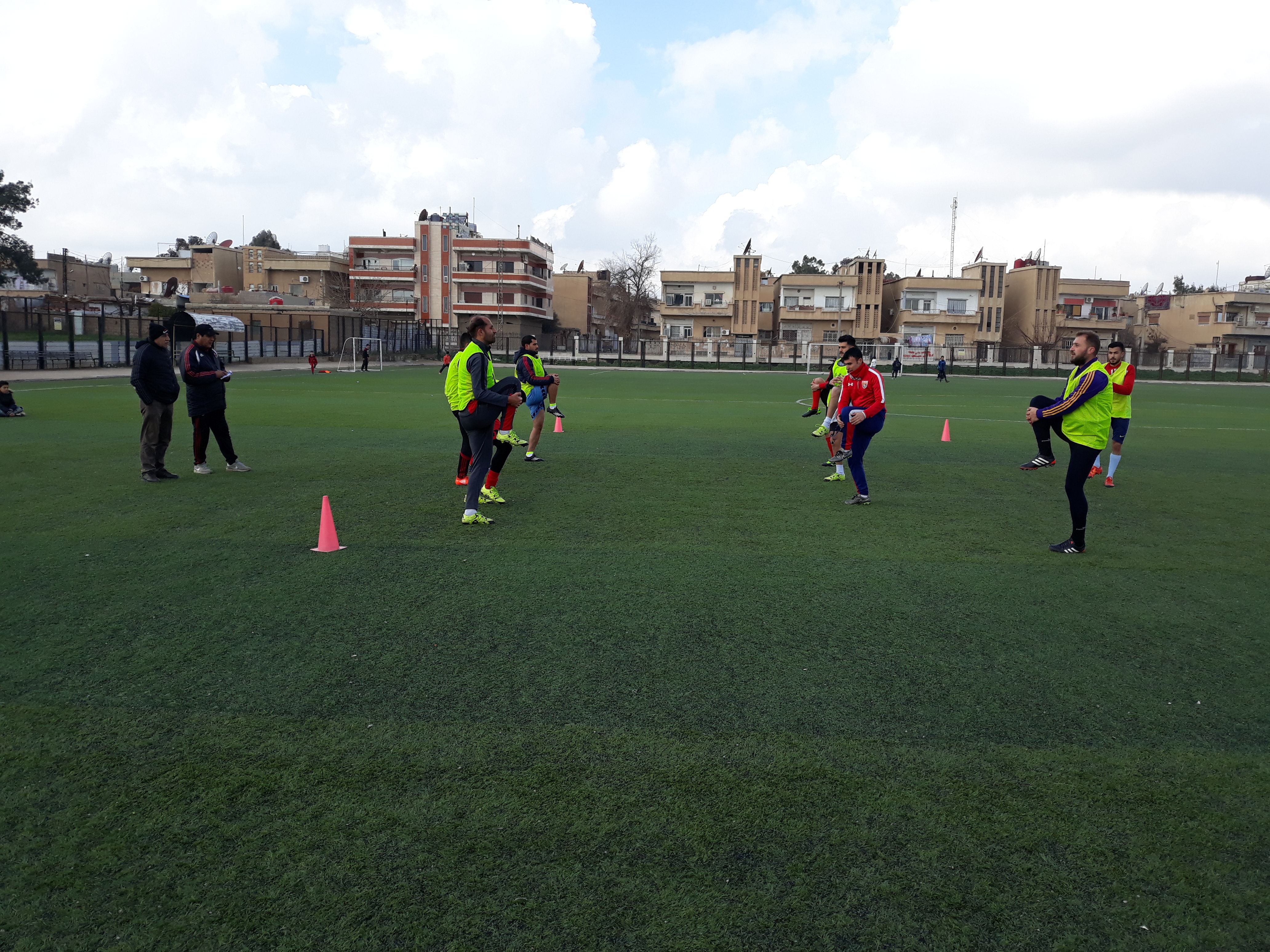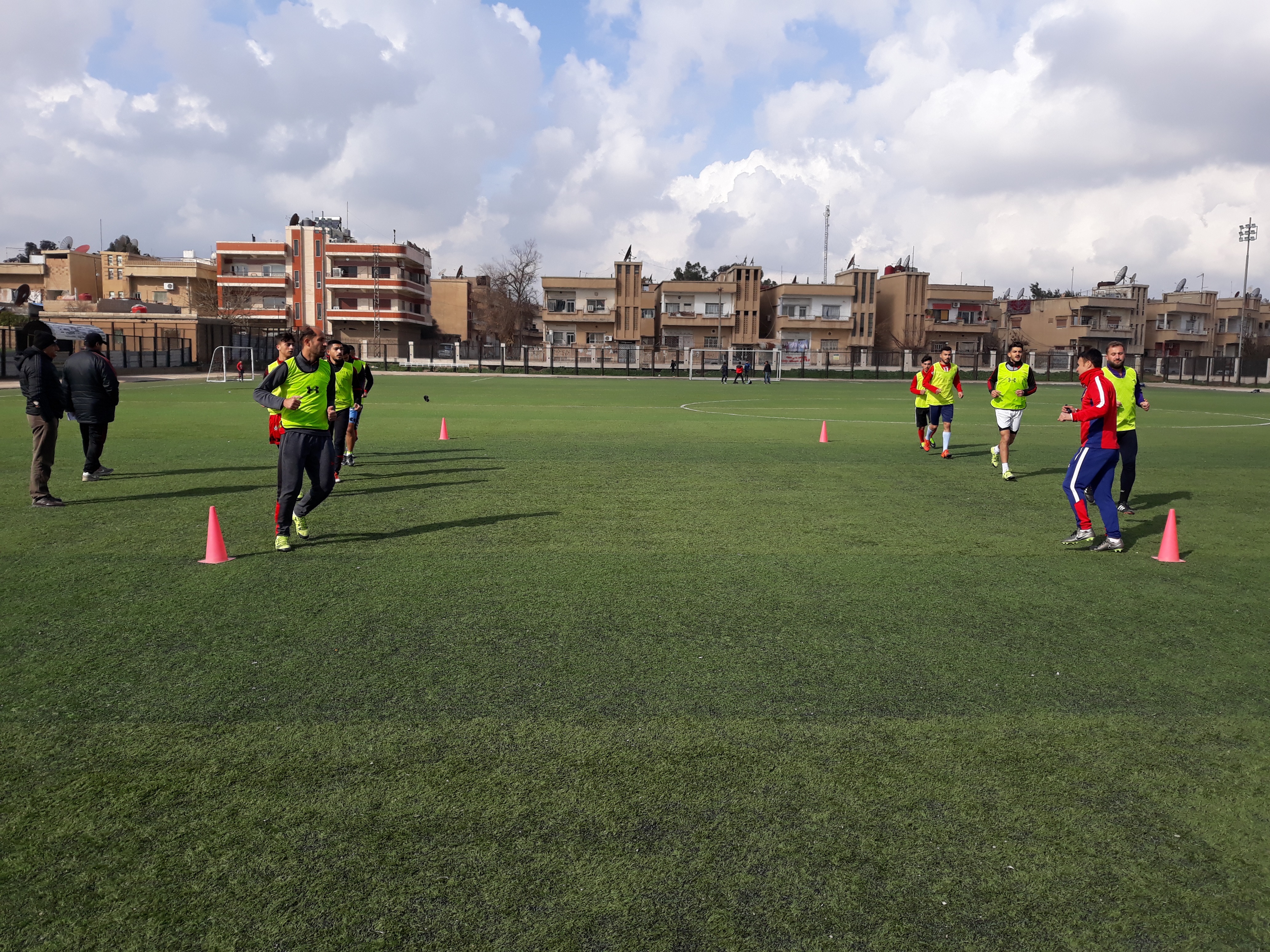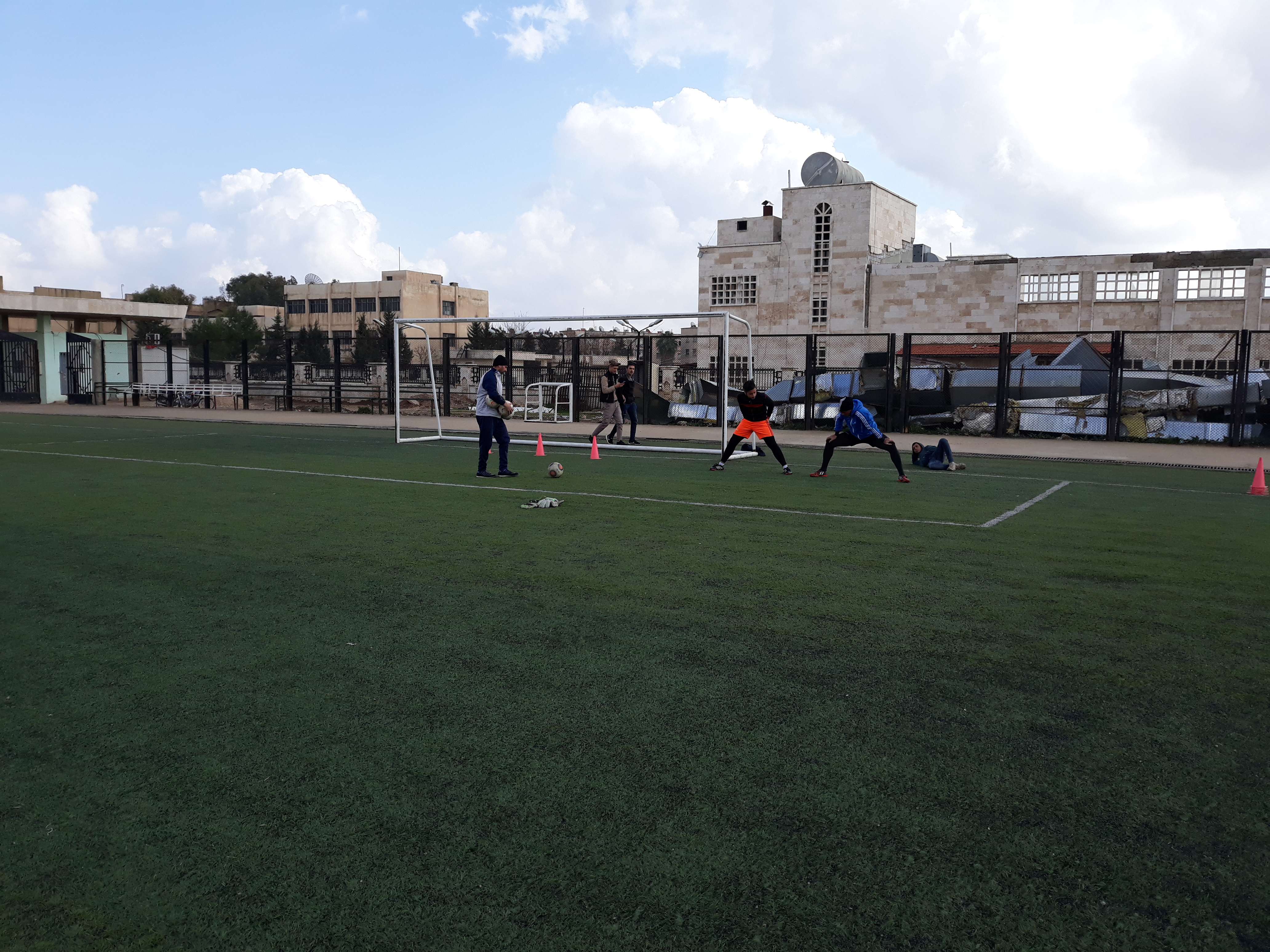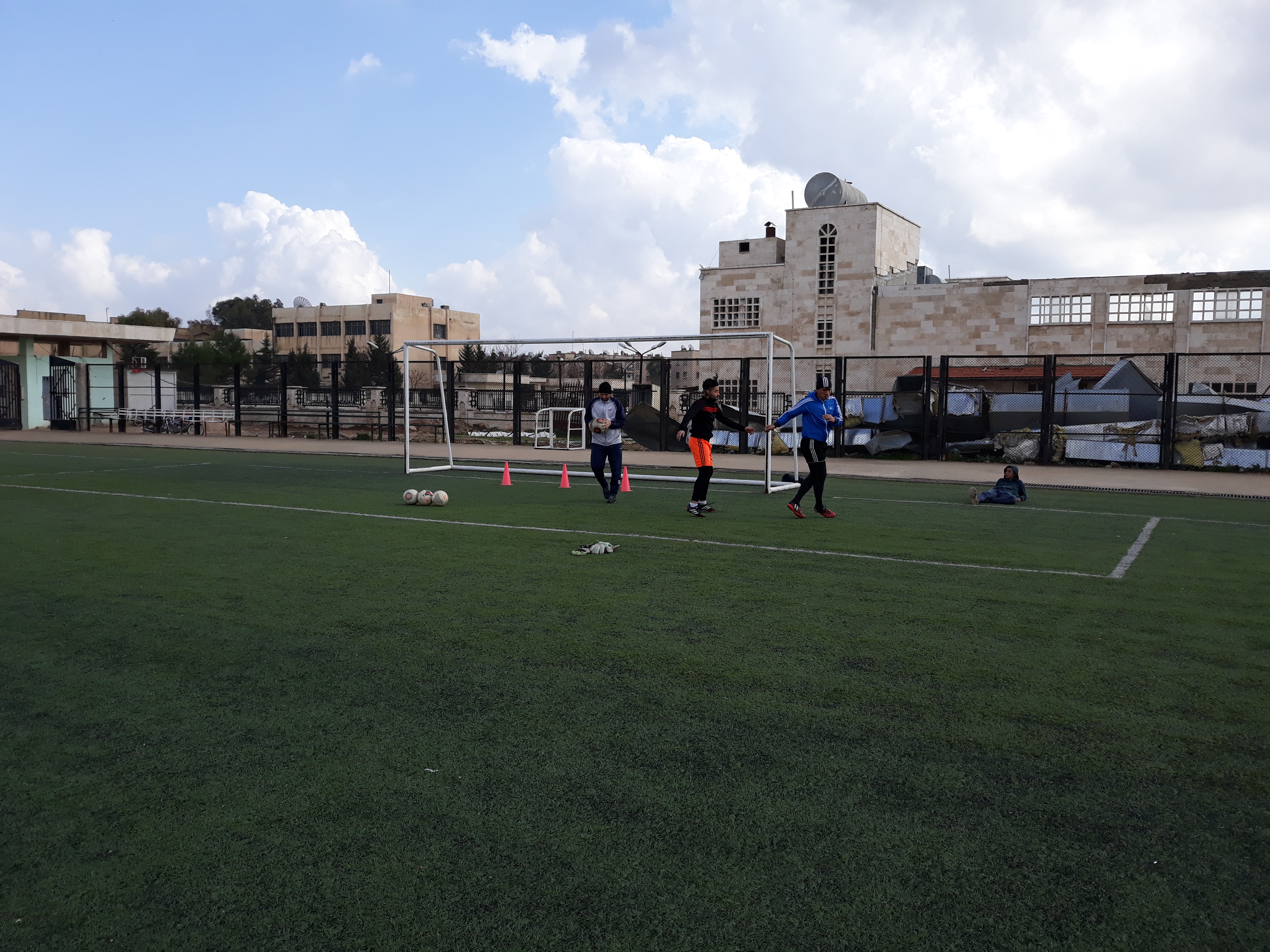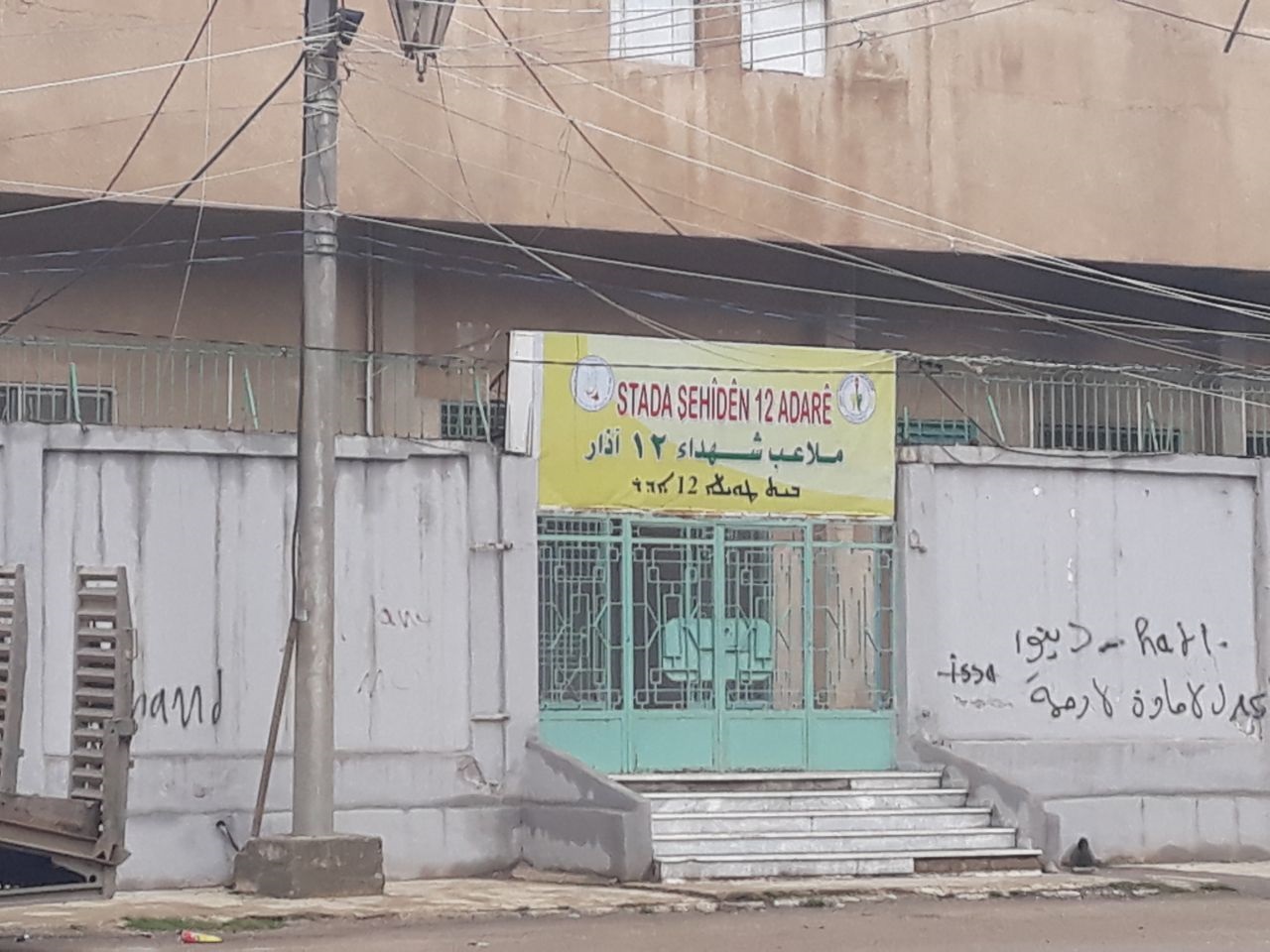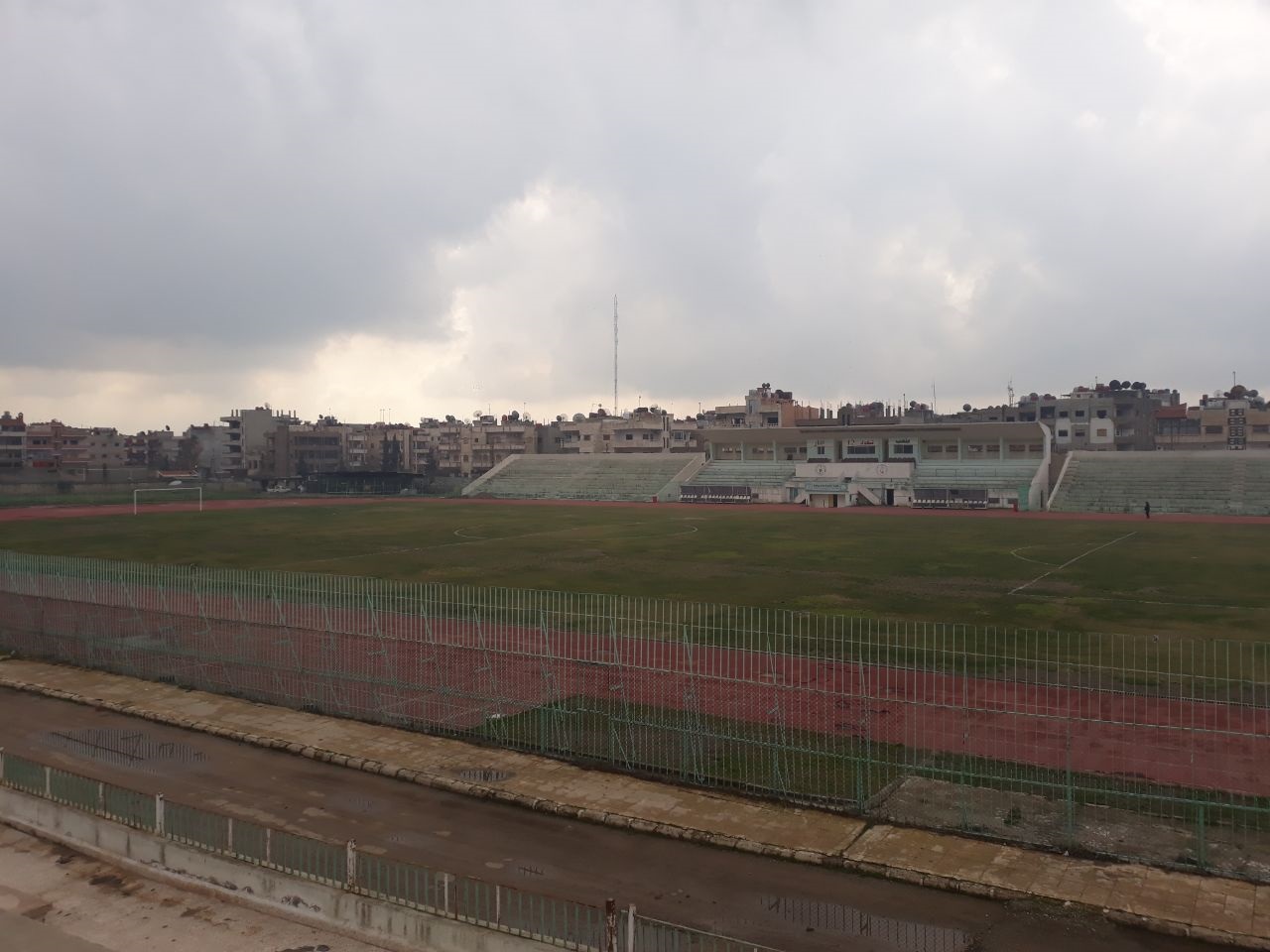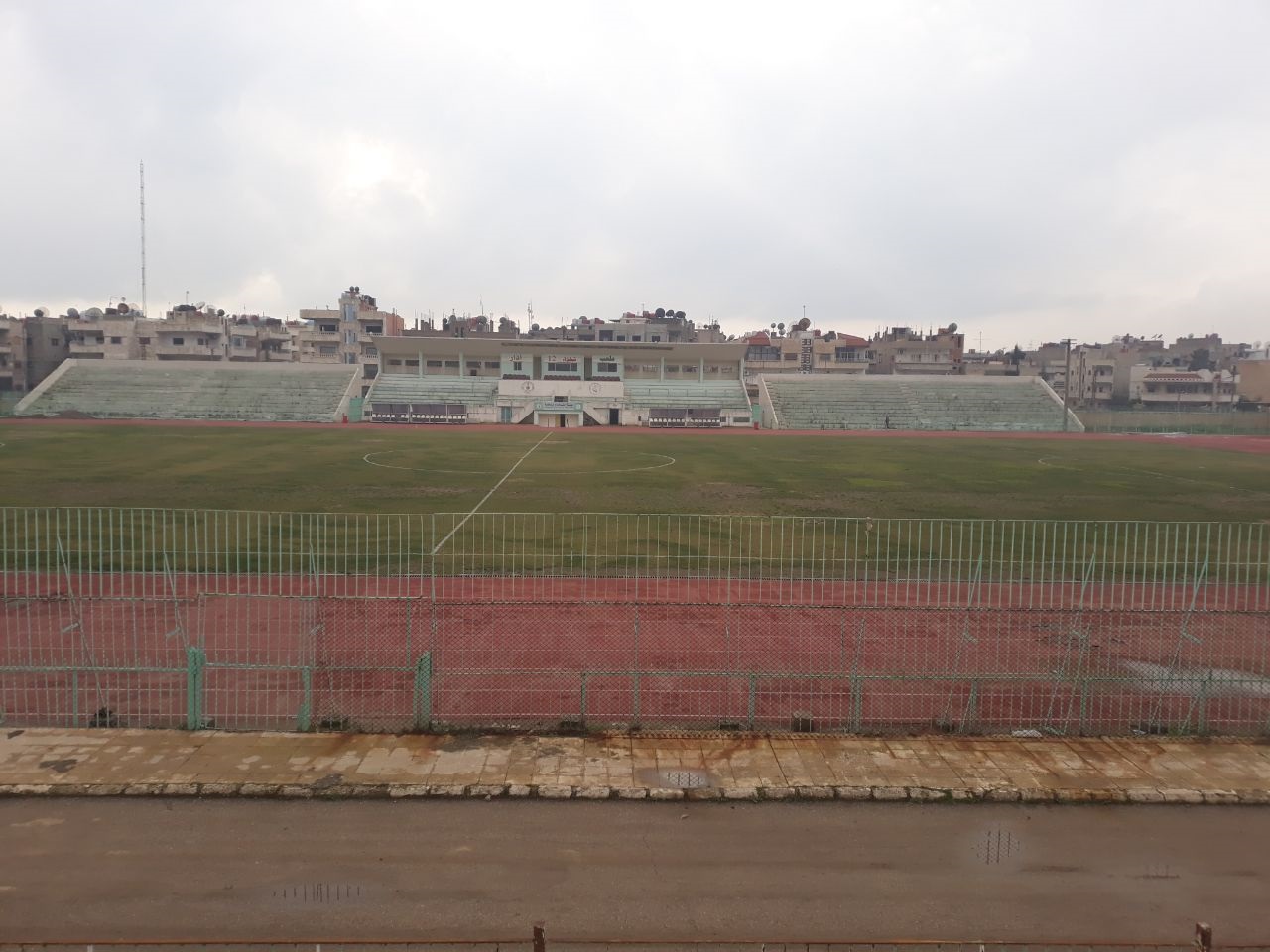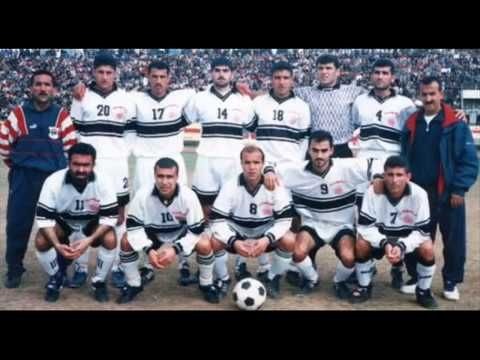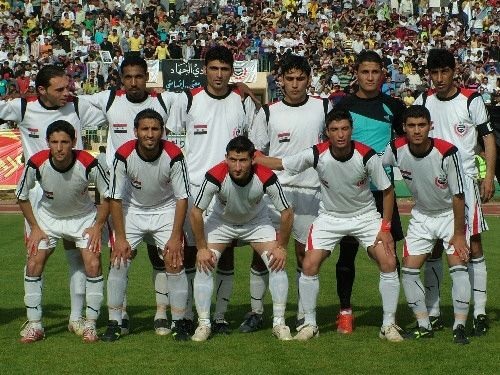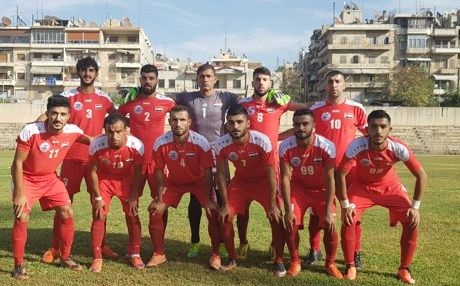Al-Jihad SC was known as the representative of Kurds, which was the main reason it faced sanctions from the Syrian Arab Federation for Football. (Kurds are an ethnic minority in Syria and they faced discrimination historically)
“The unfair sanctions against the club included eliminating our score in the away games end of the 1990s. We played during the home games with exceptional resolve, and we succeeded with a miracle in staying in the Premier League,” according to the veteran athlete and head and coach of Al-Jihad SC for many years George Khazoum.
Khazoum talked about the injustices that the Bogey of the North [nickname for Al-Jihad SC] faced from the Syrian Arab Federation for Football.
Successive managements, skilled players, a big fan base and pivotal milestones built the history of Al-Jihad SC, which resembled a civil society organisation that included all ethnic and religious groups of Al-Jazira province in the extreme northeast of Syria. Khazoum believes the club helped in maintaining national cohesion and peaceful coexistence.
However, delving into the internal disputes between the players and the management prevents the observer from taking matters at face value, discrimination was the name of the game at a certain point.
Perhaps appointing a Kurdish manager at the helm of the club for the first time, more than half a century after its establishment, is the best example of the past discrimination and isolation measures against Kurds.
First Kurdish Manager for Al-Jihad SC…A Long Time Coming
Al-Jihad SC was established in 1962, and several prominent figures in the Syrian Al-Jazira province presided over it.
The conventional quota system used to appoint the board members of the club meant the membership of Al-Jihad SC club is divided between Kurds, Arabs and Syriacs). Kurds were never allowed to manage the club, even if they were selected as members, until 2011.
Khazoum said that the Committee of Youths and Sports at the branch of the Arab Socialist Baath Party in Al-Hasakah handled the formation of the management boards of the club. This might explain the reasons behind customary limitations that prevented Kurds from being appointed as managers of the club before 2011, given the absence of declared legal restrictions.
Perhaps what is more remarkable is that some security officers in the region meddled with the affairs of the club and pressured the management to “sell” some games when coastal teams like Jableh and Teshrin competed.
Khazoum who refused a direct offer to sell a game against Jableh team during the 2000-2001 season supports the above theory. During that season, Al-Jihad SC players and the technical and training staff had to hide in a Syriac church in Tartab outside the city on the eve of the game to escape pressure and intimidation of the security and intelligence.
Reber Msawar, the first Kurdish manager of Al-Jihad SC, said, “I was offered an administrative job after graduating from university, but I turned it down. I wanted to be the president of the board and choose the members.”
Despite the harsh conditions facing Al-Jihad SC, mainly closing the municipal stadium (currently renamed the 12 March Martyrs Stadium) by a security and political decision after the 2004 riots, the club achieved good results that qualified it for the finals in the First Division League and increased its chances of qualifying for the 2019-2020 Premier League.
However, Captain Didar Zaza, former board member, still noticed a huge difference between the previous and current management and said that “the former management was experienced and made up of prominent figures, while the members of the current management are not all athletes.”
“It is possible to have people who do not support Dr Reber because he is Kurdish, but this is not a general phenomenon,” Zaza added.
Msawar insisted he chose the board management based on competence rather than just adhering to the quota, saying, “I am against the quota system because no difference should exist between the ethnic and religious groups and there should be free elections.”
Role of the club in social cohesion
The symbolic club remained the brightest example of the integration of different ethnic and religious groups in the city which suffered from marginalisation by successive Syrian governments that discriminated between citizens based on sect and race.
Captain Khazoum underlined the importance of women’s presence in cementing a non-discriminatory culture, noting that “the club was unique in its women fan base on the bleachers. The presence of women was a key factor for the club, and it prevented tensions among fans.”
Qamishli, which has a surface area that exceeds 4,000 square kilometres, is a melting pot where Arabs, Kurds, Syriacs, Armenians and Assyrians lives. The neighbourhoods in the city are divided, with little intermixing between the ethnic and religious groups in some neighbourhoods. However, the city did not witness social tensions, except during the 2004 Qamishli riots after Al-Jihad SC game against Al-Fotuwa SC from Deir ez-Zor. The riots soon turned into the Kurdish uprising which led to a conflict, small as it may have been, between Qamishli Arabs and Kurds. Still, Al-Jihad SC did not spare any efforts to play the needed social role to contain the conflict and prevent its spillover.
Fouad al-Qoss, a former manager of the club, confirmed this by saying, “I played a key role along with the club management and coaches in instilling peaceful humanitarian, social and athletic coexistence in our club and city. The internal conflict in the club was a technical and athletic one that served the interests of the club, and the results of the club teams and their championships prove this.”
Khazoum talked about how the club management handled internal disputes. He said, “When we noticed tensions between the two club stars Haytham Kajjo (Kurdish) and Maher Malki (Syriac), we threatened both players to expel them from the club, but they overcame the dispute.”
Kajo was the scorer of Al-Jihad SC and the Syrian Premier League for men for two seasons. He played for the Syrian National Football Team and died in a car accident in 2002.
Malki played in the Youth and the Men Leagues with the club. He was a scorer and striker, and he played for the Syrian National Football Team and Al-Jaish SC, then he migrated to Sweden to do his professional training.
The two players competed in the Scorers’ Championships in the Syrian Premier League.
Captain Zaza said, “The players in the club were not divided. As management members, we were like family, and we had close relations.”
Sports Dispute or Discrimination?
Al-Jihad SC is the first sports team from the far northeast of the country to achieve relatively good results in the Syrian Premier League, despite the difficult circumstances it faced, which earned it respect and set it apart in Syrian sports and social circles.
However, disputes that resulted from tensions and discriminatory treatment based on ethnic affiliations affected the club.
Qaddafi Asmat, a former midfielder in the club from Qamishli who retired in 2016, revealed discrimination between players, as “the club management abused the rights of Kurdish players.” He had played in both Youth and Men Leagues with Al-Jihad and also played with several other Syrian clubs. He is currently the Jihad’s SC assistant coach.
Asmat complained about Qoss who managed the club for successive periods, and he said that Qoss deprived him of professionalism at an early stage, while he was lenient with other players (Christians and Arabs). Asmat believes his Kurdish roots were at the heart of this deprivation.
Qoss narrated the details of the player's case, saying, “Asmat asked to move to Al-Hurriya SC (from Aleppo) after Al-Jihad SC relegated in 2004. I proposed Al-Jaish SC (a Damascus club) instead because they offer an advance on the contract and a guaranteed tempting salary.”
Asmat argues that this discrimination did not affect players’ relations with each other. They were harmonious, but “ the management was trying to give the public a false impression there are disputes among the players.”
Asmat said, “Qoss worked against me and hurt me. He did not send me to any training, although it was my right as a player in the club and the national team previously.” Qoss dismissed these accusations as groundless and said, “We held a session for all players and coaches of the club, but he did not enrol despite having been notified.”
Sports’ professionalism system was implemented for the first time in Syria in the 2000-2001 season, but it did not achieve the required success.
How it all started
- Al-Shabiba club (Al-Jihad SC currently) was established in 1962 by lawyer Nizar al-Abrash and five other members after a governmental decision was issued to disband Al-Rafideyn, Qamishli and Al-Arabi clubs.
- Al-Jihad SC travelled to Jordan and played in Jerusalem (that was part of Jordan back then), Mosul, Baghdad, Erbil and Kirkuk.
- The club qualified for the Premier League in 1979.
- In 1971, legislative decree no. 38 that organises sports in Syria was issued, and it was made public in 1972. The Syrian government then named the club Al-Jihad.
- Al-Jihad SC played its first game against Al-Ittihad Club during the Premier League. The game ended with a scoreless tie.
- The club headquarters were part of Qamishli municipality, which later became owned by the club.
- The first relegation happened in 1986 due to punishment from the Federation (14 points were eliminated from the club’s score, and five players were barred from participating in the tournament. The team was banned from playing on its ground because its player, Ammar al-Youssef, attacked the referee).
The club faced three painful accidents. In the first one, a truck loaded with rocks crashed into the club’s bus on the Syrian coastal road. Five of the players and managers lost their lives during the 1991 season (coach Abboud Iskandar, manager Hussein Souaid, goalkeeper Abdel Ghani Atouka, physician Bidik and driver Flemz). The second accident happened in 1994 on the Aleppo-Damascus road near Saraqib city, where the engine of the bus caught fire and turned it into ashes, and the team miraculously survived. The third accident happened on Deir ez-Zor road in 2002, when a truck hit a van transporting some of the players. Kajo and the driver Mohammad Rashad Younes died on impact.
Two spikes of wheat, the petroleum sign and three stars represented the logo of the team, indicating that it was a Premier League team. Artist Jean Karat designed the logo in agreement with the club management. Karat was a member of the club then.
The official uniform was red, but the team later turned into to white with black streaks due to the accidents it suffered.
The most significant achievement of Al-Jihad SC was coming first in the general category and second in the Men League after Al-Jaish SC. The team also won the Youths’ Prize and first and second place in the Scorers’ Competition for 2000-2001.
Al-Jihad SC under the self-rule administration
After the Syrian war in 2011, the northeast of Syria came under de-facto rule of Kurdish forces headed by the Democratic Union Party. The area stayed relatively safe, but its routes to the rest of the country were cut due to fighting and later the presence of the Islamic State IS. Thousands of the city's inhabitants migrated to the Iraqi Kurdistan Region, Turkey and Europe. Kurds and Syriacs constituted the biggest number of migrants. The influx of thousands of displaced people from Syrian cities to Qamishli affected the demographic situation. Although Kurds maintained a majority in the city, Arabs outnumbered Syriacs. There is an absence of official statistics from the Syrian government or the self-rule administration which conducted a census in 2016 without revealing its results.
The Youths and Sports Association affiliated with the self-rule administration regulates sports in Al-Jazira province, and it that was formed in 2014. The Sports Federation in Al-Jazira constitutes a branch of this association and oversees all sports activities in the province.
Although the Sports Federation offered financial assistance to Al-Jihad SC, estimated at 2 million Syrian Pounds (SYP) in 2017 and 1.5 million SYP in 2018, in addition to a meeting room for the board members of the club, Al-Jihad is not licensed by the federation and administratively follows the General Sports Federation (GSF) in Damascus and its executive branch in Al-Hasakah. It also participates in the Syrian Premier League.
Al-Jihad SC goalkeeper Imad Issa talked about the suffering of the club when it is not playing on its field. He said, “We travel to Damascus on cargo aircraft, which is suffering personified. Recently, we travelled to Hama by bus for 17 hours. The General Sports Federation (affiliated with the Syrian government) provides buses to take us from Damascus to the city where the games are held. We sometimes have to play three games per week.”
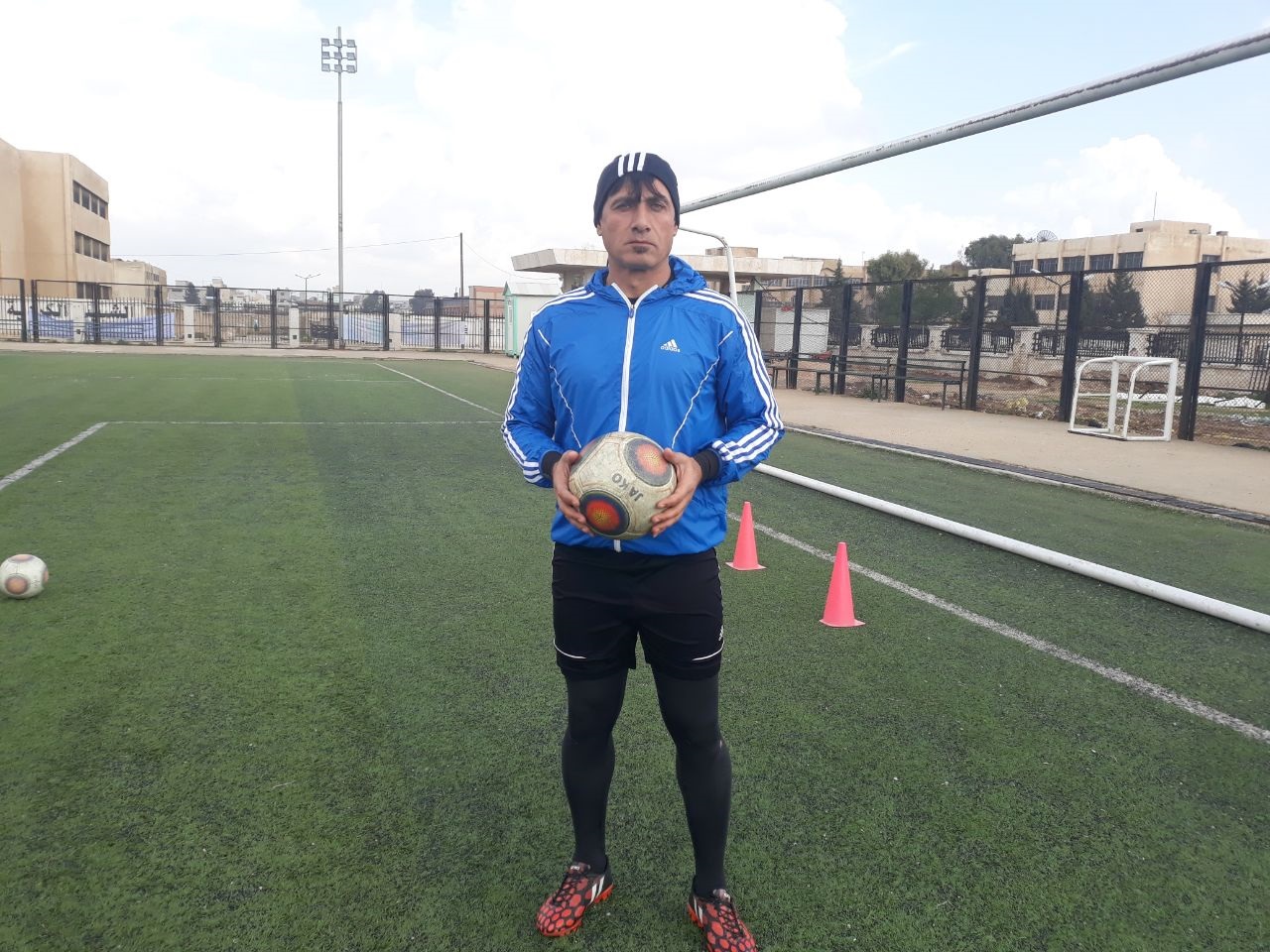
Issa complains about the injustice which Al-Jihad SC faces. He says that relations between the Sports Federation in Damascus and the club are at their lowest compared to other Syrian clubs. He believes this resulted from lack of financial support (from Damascus) and not allowing the club to play on its ground while competing in the Syrian League. He adds, “I think the reasons are political because sports and politics are inseparable. If it weren’t for politics, Al-Jihad SC would have been able to play on its own ground and in front of its fans. We want Qamishli’s football to rise again, and we want to enjoy our fans’ support.”
The football bureau at the Sports Federation affiliated with the self-rule administration organises football tournaments, in addition to participating in the Syrian Cup throughout the year for men and women. There are 20 teams for men in the province and six for women.
These teams support Al-Jihad SC with players from all age groups, and these players constitute the foundations of the team and its main power.
Khazoum seems optimistic about the club’s future. He says, “Qamishli is a city filled with talent. It will continue to create players as long as its women can give birth. It is Syria’s Brazil. Al-Jihad will remain as we know it, despite the difficult circumstances.”


